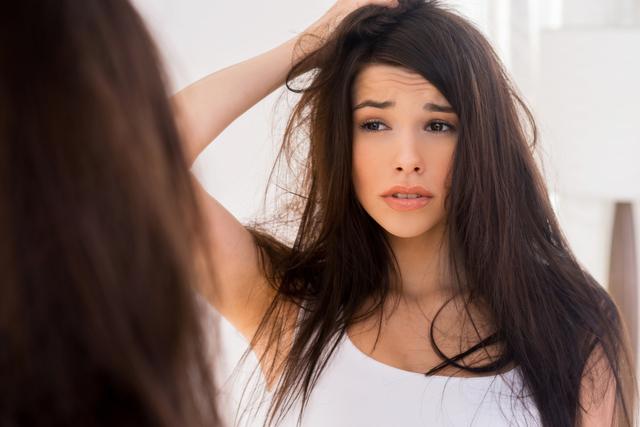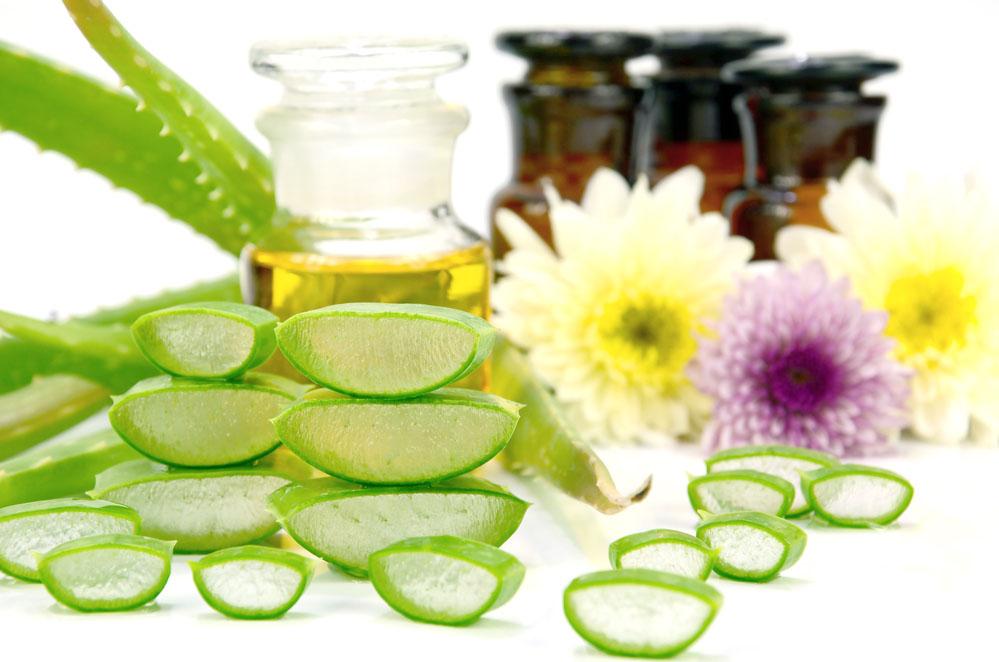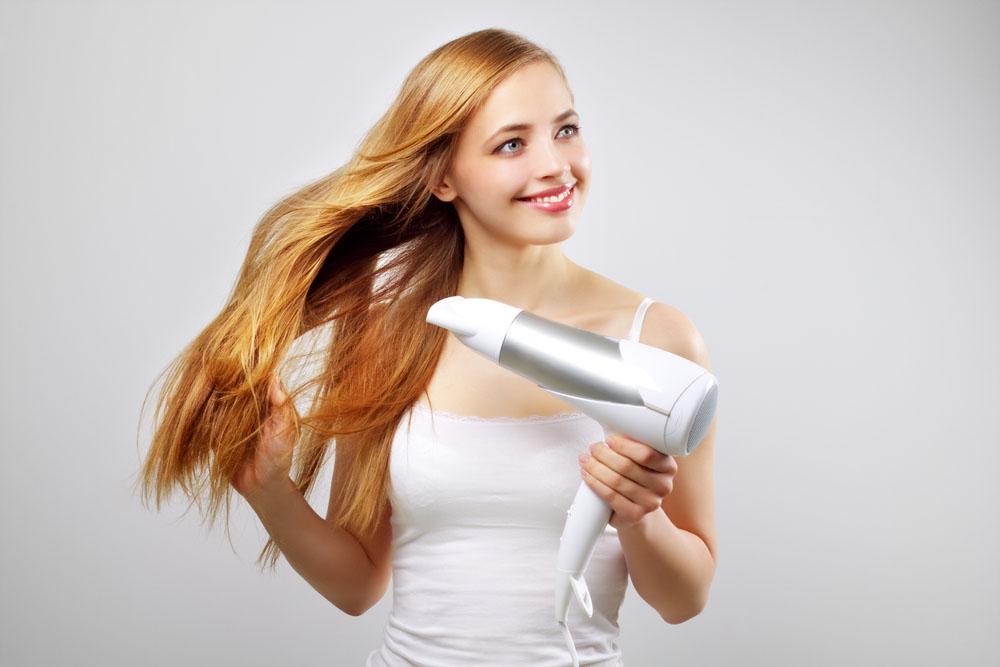
The problem with oily hair affects both women and men. Sticky, sticky, greasy hair that is close to the skin doesn't look good, and while fighting them is a challenge, it's worth taking them. A protracted problem can lead to bacterial or fungal infections, significant hair weakness, hair loss and even baldness.
So today about what can be the cause of greasy hair and how to deal with such a problem.
Hair becomes greasy when the sebaceous glands on their roots begin to produce too much sebum for some reason. Tallow in combination with the remains of dead epidermis, cosmetics residues and dirt creates plugs, clogging the hair follicles, preventing them from getting enough oxygen and nutrients. Hair is not only greasy, but also weak and often dry especially at the ends. They begin to crumble, split ends, get sick and, as a consequence, fall out.
The reasons for oily hair are really many, it can be a bad diet, excess stress, hormonal disorders occurring in the body, e.g. during puberty, menopause, or during menstruation, problems with thyroid function, seborrheic dermatitis, poor care, inadequate hygiene , vitamin and mineral deficiencies or just genetic predisposition. Excessive sebum production is very harmful to the scalp and hair, so it is extremely important to find the cause and take the right steps to help eliminate it.
What can we do if oily hair is our problem?
The first thing to do is take care of your skin and scalp. No matter how you look at it, it is the foundation for healthy and beautiful hair.
Choose a good shampoo
The shampoo should be chosen to helps significantly reduce or completely eliminate the problem without damaging the hair or scalp. For oily hair, you have to choose cosmetics that have been specially created for them. However, it is very important that they do not dry out and irritate the scalp. If this happens, the sebaceous glands wanting to protect it from losing adequate moisture levels will increase sebum production. The effect will be opposite to what was intended. Watch out for colored and intensely fragrant shampoos. Try to avoid those containing SLS (Sodium Lauryl Sulfate) and SLES (Sodium Laureth Sulfate) as well. If the effects of cosmetics are too strong, the protective lipid layer may be damaged and the skin may become excessively dry. Choose those in which popular washing substances have been replaced with more delicate ones (e.g. Coco Glucoside, Capryl Glucoside, Disodium Cocoyl Glutamate). If you don't want to put extra weight on your greasy hair, give up silicon shampoos. When choosing the right cosmetic, always read carefully its properties and learn its composition. Good shampoos are those containing herbal extracts, e.g. sage, nettle, rosemary, hop cones, linden, lemon balm or chamomile. Citrus fruit extracts also have a very nice effect. The shampoo should also not lack B vitamins, vitamins C, A and E. The cosmetic for oily hair should allow to maintain the proper pH for the scalp and hair, and regulate sebaceous glands, reducing sebum production. However, because it is used very often, it must also be gentle so as not to irritate the scalp and not to dry it.
When washing your head, rinse your shampoo well each time so that you do not leave any cosmetic residue on your hair. Also remember that the water you use is not too hot, and when wiping your hair, avoid strong friction with a towel so as not to stimulate the sebaceous glands to work.

Oily aloe gel will also do very well. You can, for example: add it to your favorite shampoo. Aloe not only has antiseptic, moisturizing and softening properties, but also perfectly regulates the sebaceous glands and soothes harmful substances contained in shampoos.
Apply conditioner gently
Oily hair is often very dry at the ends, therefore conditioners are an extremely important element of their care. Remember, however, not to apply them to the scalp and hair roots. Certainly you will not need heavy conditioners for dry hair, it is also not the best idea to use cosmetics that you do not rinse after application. Choose nutrients containing ingredients that normalize sebaceous glands and reduce sebum production. Jojoba oil works great here, which contains vitamins, squalene, fatty acids and phytosterols, and also dissolves and absorbs excess sebum, while regulating its secretion. Tea tree oil may also be found in the conditioner for oily hair, it has a strong antifungal, antibacterial and anti-inflammatory effect, soothes itching and irritations and perfectly regulates sebaceous glands. Helps fight dandruff and excessive greasy hair. It is also used for seborrheic dermatitis. A few drops of such oil can be added to your shampoo or favorite conditioner.
Oily hair with rosemary, aloe, white clay, nettle or green tea will also help your greasy hair. However, you must always remember to thoroughly rinse the cosmetic from your hair, do not use too warm water for it, so as not to stimulate the sebaceous glands to work. It is best to rinse them with cool water at the end, but remember not to overdo it, it can not be too cold.
The art of stylization
Oily hair is not easy to style as we would like, also keeping your dream hairstyle for a long time is something very difficult. When styling, first of all, try not to burden the hair. So choose light preparations and limit their use to the necessary minimum. Do not apply gels, creams, pastes and waxes to your hair, it is better to choose delicate light foams and sprays.
Oily hair should also not be combed too often, try to touch it as little as possible and refrain from combing them with your fingers.
It's best if you let the hair dry without the dryer interfering, but try not to go to sleep when they are still wet, thus avoiding tangling and breaking. However, if you need to dry your hair, do so by directing a cool stream of air at them. Limit and, ideally, give up using the straightener and curler completely, the heat they generate will only aggravate your problem.

Lotion
This is a very important element of oily hair care, well selected or prepared independently, they perfectly regulate the production of sebum and help get rid of its excess, while refreshing and strengthening the hair as well as nourishing and toning the scalp. You can prepare such a rinse with coltsfoot infusion, which will reduce sebum production. If you mix it with thyme, you will get a rinse, which will also have antiseptic and cleansing properties. You can also make a very good rinse using fresh aloe vera juice. Just dilute it with water in a 1: 2 ratio (aloe juice: water). Thanks to it, the hair will be moisturized, it will be easier to style and not greasy at the same time. The infusion of birch, in turn, will help you create a cosmetic that not only regulates the work of sebaceous glands, but also strengthens hair bulbs and reduces hair loss. Oily hair will also help lemon rinse or apple cider vinegar. Add 1 tablespoon apple cider vinegar or 1 tablespoon lemon juice to a glass of lukewarm boiled water. Such a rinse will allow you to cleanse the hair of cosmetics residue, remove excess sebum and make it shine. Be careful not to overdo it. Too acidified hair and scalp will become dry. Oily hair will also help with chamomile, mountain arnica and hops.
Mask and oil
It is not true that owners of oily hair should avoid masks and oiling, on the contrary, they must take care of intensive nutrition and moisturizing of hair and scalp. Of course, it is very important to choose the right cosmetics and pay attention to the composition of masks and the type of oils, so as not to burden the hair. You should not exaggerate the frequency of this type of treatment, devote some time to it twice a week. Try castor, sage, thyme, rosemary or tea tree oil, just add a few drops to half a glass of olive oil, coconut or almond oil and massage the resulting mixture into your hair. You will strengthen the effect of oils if you wrap the hair in foil for about an hour. In turn, you will create a very good mask from tomato. Thanks to its properties, perfectly balance the pH level of the scalp and hair, nourish them well and regulate the sebaceous glands. All you need is a mashed tomato or thick puree to massage into your hair and leave for 10-15 minutes. A cosmetic made of mixed ripe banana combined with a spoon of honey will also be a very good mask for oily hair. Aloe pulp (1 tbsp), lemon juice (one tbsp), honey (1 tbsp) and yolk will also have a nice effect. The cosmetic prepared in this way will nourish your hair, refresh it, allow you to get rid of excess sebum and regulate the sebaceous glands, without causing irritation or drying of the scalp and hair.
Eat healthy and sleep well
Remember also that the condition of your hair is affected by diet, stress and lack of sleep. So try to change your lifestyle so that it finds time for relaxation and a good night's sleep (about how sleep affects our body, read in the entry "Sleep peacefully"). Instead, enrich your diet with vegetables, fruits, fish, cheese, nuts, lean meat, grape seed oil, linseed oil, coconut oil and olive oil, don't forget about whole grains. Instead, limit your consumption of sugar, wheat flour, salt, stimulants and animal fats. The right diet should be composed so that it does not lack vitamins, minerals and unsaturated fatty acids. Also take care of the right amount of exercise, a sedentary lifestyle has an adverse effect on both health and beauty.
Remember that greasy hair is not only an aesthetic issue, but also a health problem. Getting the right treatment can help you get rid of it for good or reduce it significantly. Therefore, if you are not able to cope with your condition, it is worth using the help of a specialist and trichologist's advice at REVIVE CLINIC.
